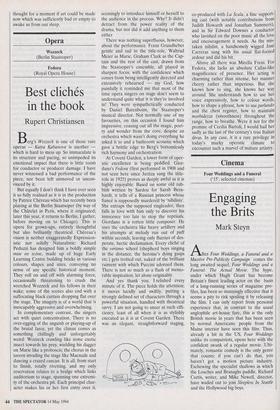Opera
Wozzeck (Berlin Staatsoper) Fedora (Royal Opera House)
Best clichés in the book
Rupert Christiansen
Berg's Wozzeck is one of those rare operas — Katya Kabanova is another which is hard to mess up. So immaculate is its structure and pacing, so unimpeded its emotional impact that there is little room for conductor or producer damage. I have never witnessed a bad performance of the piece, nor been left unmoved or uncon- vinced by it.
But equally I don't think I have ever seen it so fully realised as it is in the production by Patrice Chereau which has recently been playing at the Berlin Staatsoper (by way of the Chatelet in Paris, where it originated; later this year, it returns to Berlin, I gather, before moving on to Chicago). This is opera for grown-ups, entirely thoughtful but also brilliantly theatrical. Chereau's vision is neither exaggeratedly Expression- istic nor solidly Naturalistic: Richard Peduzzi has designed him a boldly simple mise en scene, made up of huge Early Learning Centre building bricks in various colours, shapes and sizes, conveying no sense of any specific historical moment. They roll on and off with alarming force, occasionally threatening to crush the wretched Wozzeck and his fellows in their wake; some of the scenes also end with a suffocating black curtain dropping flat over the stage. The imagery is of a world that is inescapably aggressive and overwhelming.
In complementary contrast, the singers act with quiet concentration. There is no over-egging of the anguish or playing-up of the brutal farce, yet the climax comes as something chillingly and unforgettably weird: Wozzeck crawling like some exotic insect towards his prey, wielding his dagger on Marie like a proboscis; the chorus in the tavern invading the stage like Maenade and dancing a crazed cancan. It is all, from start to finish, totally rivetting, and my only reservation relates to a bridge which links auditorium to stage, spanning one extremi- ty of the orchestra pit. Each principal char- acter makes his or her first entry over it, seemingly to introduce himself or herself to the audience in the process. Why? It didn't detract from the power reality of the drama, but nor did it add anything to them either There was nothing superfluous, however, about the performance. Franz Grundheber gentle and sad in the title-role, Waltrud Meier as Marie, Graham Clark as the Cap- tain and the rest of the cast, drawn from the Staatsoper's ensemble, all played in sharpest focus, with the confidence which comes from being intelligently directed and extensively rehearsed — my God, how painfully it reminded me that most of the time opera singers on stage don't seem to understand quite what it is they're involved in! They were sympathetically conducted by Daniel Barenboim, the Staatsoper's musical director. Not normally one of my favourites, on this occasion I found him impressive, coaxing out all the magic, poet- ry and wonder from the core, despite an orchestra which wasn't doing everything he asked it to and a bathroom acoustic which gave a brittle edge to Berg's bottomlessly rich harmony and orchestration.
At Covent Garden, a lower form of oper- atic excellence is being peddled. Gior- dano's Fedora (first performed in 1908 and not seen here since Jeritza sang the title- role in 1925) proves as deeply awful as it is highly enjoyable. Based on some old rub- bish written by Sardou for Sarah Bern- hardt, it tells of a Russian princess whose fiancé is supposedly murdered by 'nihilists'. She entraps the supposed ringleader, then falls in love with him only to discover his innocence too late to stop the reprisals. Giordano is a rotten little composer. He uses the orchestra like heavy artillery and his attempts at melody run out of puff within seconds, leaving only flurries of des- perate, hectic declamation. Every cliché of the verismo school (shepherd boys singing in the distance, the heroine's dying gasps etc.) gets trotted out, naked of the brilliant raiment with which Puccini adorned them. There is not so much as a flash of memo- rable inspiration, let alone originality.
And yes thank you, I relished every minute of it. The piece holds the attention; it moves lucidly and swiftly, putting a strongly defined set of characters through a powerful situation, handled with theatrical savvy. I am not going to sneer at such effi- ciency, least of all when it is as stylishly executed as it is at Covent Garden. There was an elegant, straightforward staging, co-produced with La Scala, a fine support- ing cast (with notable contributions from Judith Howarth and Jonathan Summers), and in Sir Edward Downes a conductor who lavished on the poor music all the love and encouragement it needs. As the mis- taken nihilist, a handsomely wigged Jose Carreras sang with his usual flat-footed ardour and did his bit.
Above all there was Mirella Freni. For Fedora, she lacks an absolute Callas-like magnificence of presence. Her acting is charming rather than intense, her manner cheery rather than imperious. But she knows how to sing, she knows her way around. She understands how to use her voice expressively, how to colour words, how to shape a phrase, how to use parlando and the chest register, how to maintain morbidezza (smoothness) throughout the range, how to breathe. Were it not for the promise of Cecilia Bartoli, I would hail her sadly as the last of the century's true Italian divas. In any case, it is a rare privilege in today's murky operatic climate to encounter such a marvel of mature artistry.


























































 Previous page
Previous page